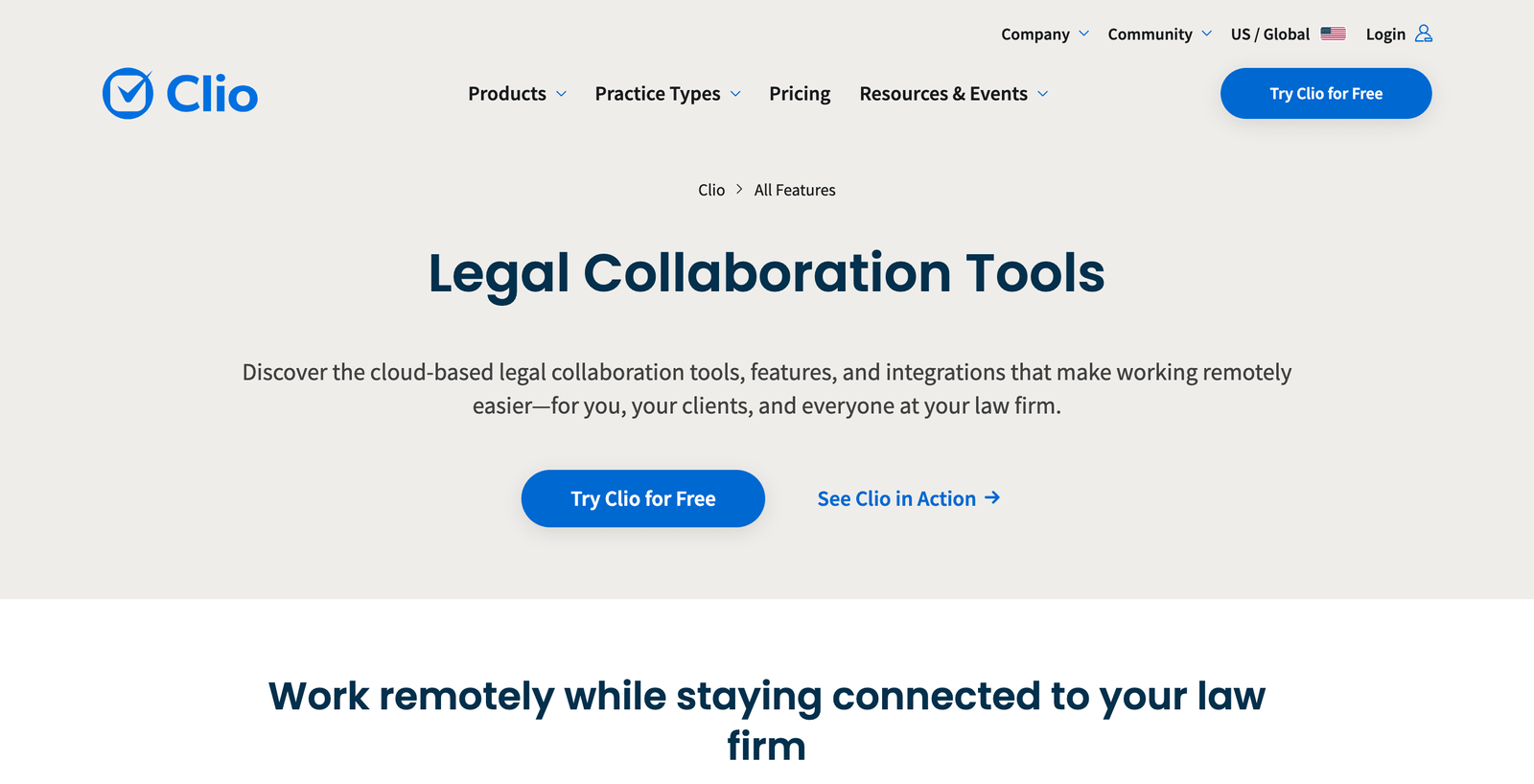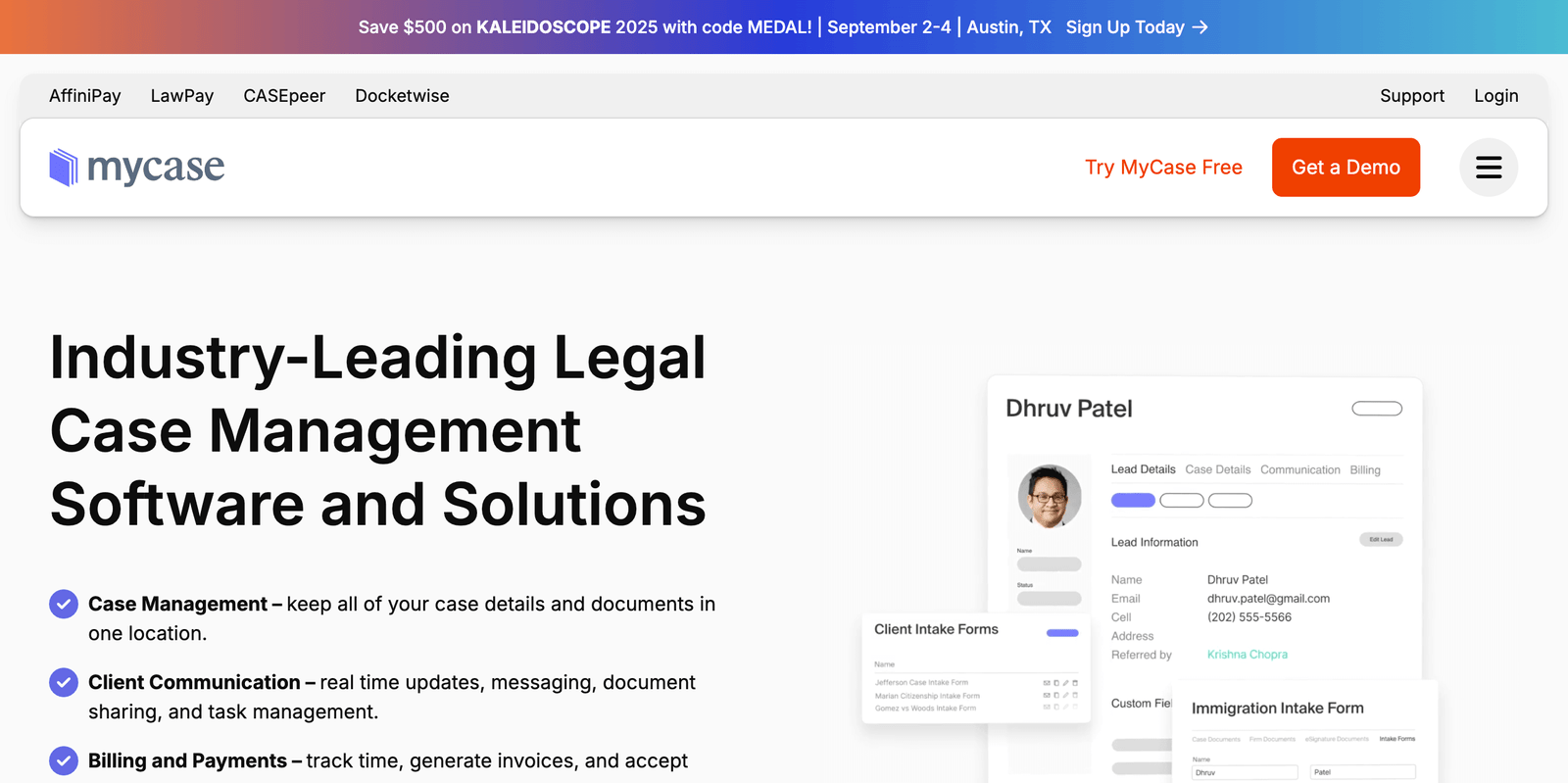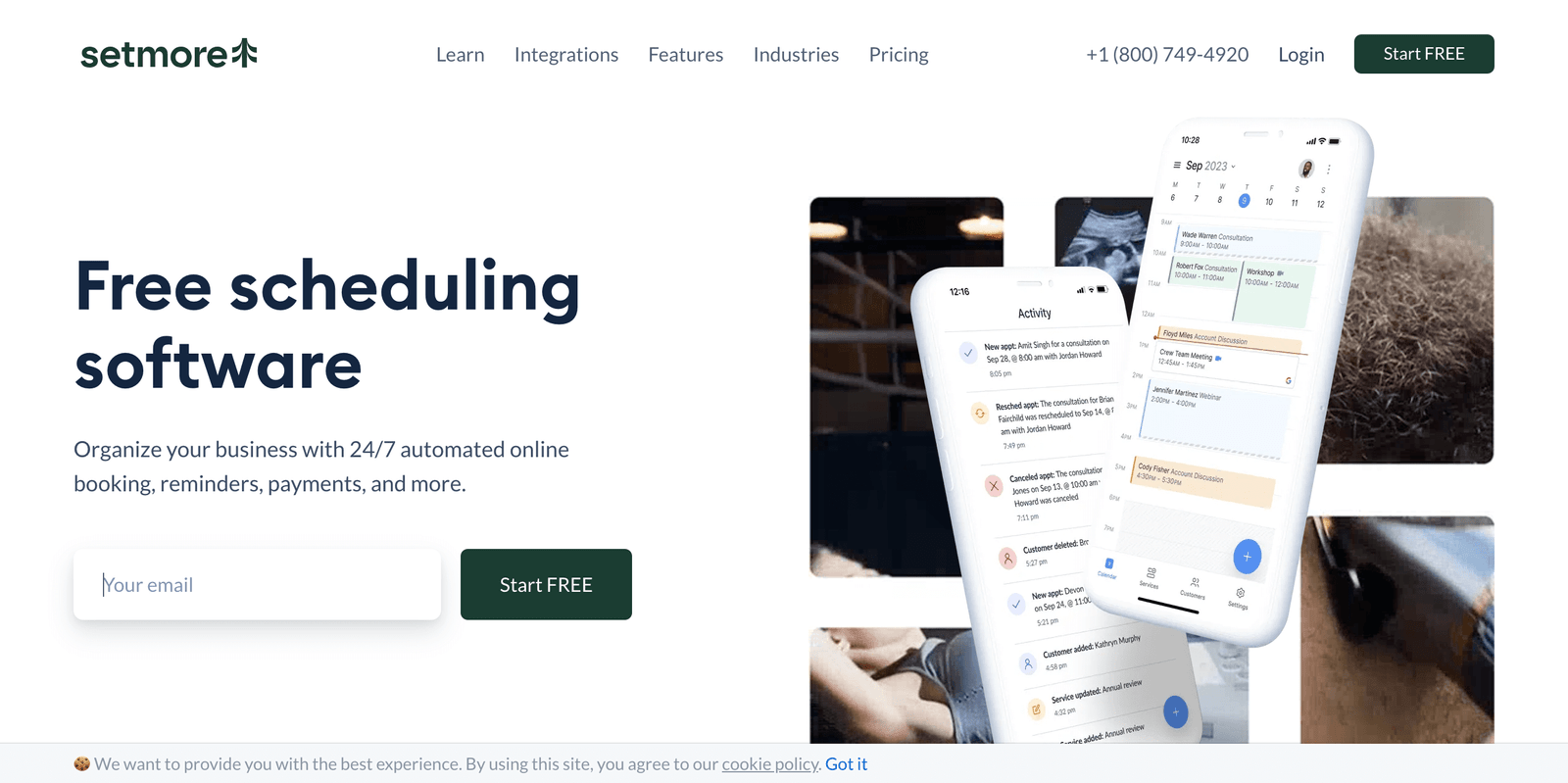Administrative law is getting more complex. Between regulatory hearings, agency deadlines, and multi-stakeholder coordination, administrative lawyers have enough challenges without wrestling with scheduling chaos. And the old way of doing things? Phone calls, spreadsheets, and missed deadlines are costing you clients and credibility.
But here’s what hasn’t changed:
If you have the right scheduling tools, you can still manage complex regulatory processes while building a profitable practice.
Not by juggling multiple systems, but by automating deadline calculations, streamlining agency coordination, and focusing on what drives real results for your clients.
The best administrative law scheduling tools help you do exactly that:
- Calculate court and agency deadlines automatically
- Coordinate complex multi-party proceedings seamlessly
- Track compliance requirements across jurisdictions
- Manage document-heavy workflows efficiently
These are the tools successful administrative law firms use to handle hundreds of regulatory matters while maintaining precision and compliance.
Most of which integrate directly with government systems and existing legal software.
The best part?
These tools work great whether you’re a solo practitioner handling OSHA appeals or managing a large regulatory compliance practice. No matter your specialization or caseload.
My Top Administrative Law Scheduling Tools for 2025
- LawToolBox: Automated deadline calculation for regulatory and court proceedings
- Clio Scheduler: Comprehensive legal practice management with administrative law features
- Actionstep: Workflow automation perfect for complex regulatory processes
- MyCase: Reliable scheduling with strong client communication tools
- Setmore: Simple, cost-effective scheduling for consultations and meetings
LawToolBox

Best for administrative lawyers who need precise deadline calculation and regulatory compliance
Pricing: From $19 per user/month; integrates with Microsoft 365
I know deadline management software might sound niche, but in administrative law, missed deadlines can literally end cases. LawToolBox isn’t just scheduling software, it’s malpractice prevention.
But I don’t recommend LawToolBox just because it prevents disasters.
I recommend it because it actually solves the unique timing challenges administrative lawyers face every day.
Automated Regulatory Deadline Calculation
LawToolBox automatically calculates deadlines for thousands of courts and administrative agencies across all 50 states.
When you’re dealing with EPA enforcement actions, FCC proceedings, or Social Security appeals, each has different rules and deadlines. LawToolBox knows them all.
Let’s say you’re handling an OSHA citation appeal. You enter the citation date, and LawToolBox automatically calendars the contest deadline, hearing preparation dates, and post-hearing brief deadlines based on the specific OSHA regulations.
This precision is crucial in administrative law where agencies have zero tolerance for late filings.
Integration with Microsoft 365 Ecosystem
Most administrative law practices already use Microsoft tools for government coordination. LawToolBox works directly inside Outlook, Teams, and SharePoint.
You can manage case files, share deadlines with co-counsel, and coordinate with agency representatives all within the Microsoft environment you’re already using.
When working on multi-party proceedings (common in administrative law), you can share specific case calendars with other attorneys while keeping your full schedule private.
Custom Rulesets for Specialized Agencies
Not every administrative agency follows standard court rules. LawToolBox lets you create custom deadline calculations for specialized proceedings.
For example, if you regularly handle Department of Labor wage and hour cases, you can set up custom calculations for their unique administrative procedures.
The system tracks rule changes automatically, so when agencies update their procedures (which happens frequently), your calculations stay accurate.
Matter Management Beyond Deadlines
LawToolBox isn’t just about dates. It helps you organize documents, coordinate with team members, and track case progress within Microsoft 365.
You can create shared workspaces for each regulatory matter, automatically organize email correspondence, and ensure everyone has access to the latest filings and agency communications.
Pros & Cons
| Pros | Cons |
|---|---|
| Eliminates human error in deadline calculations | Requires Microsoft 365 (not suitable for firms using other platforms) |
| Covers thousands of jurisdictions including administrative agencies | Learning curve for teams not familiar with Microsoft ecosystem |
| Automatic rule updates prevent missed deadline changes | Limited standalone scheduling features beyond deadline management |
LawToolBox Alternative: CompuLaw
CompuLaw is another deadline calculation system used by many administrative law practices.
It offers similar automated deadline calculations but works as a standalone system rather than integrating with Microsoft 365.
However, LawToolBox’s deep Microsoft integration and more comprehensive rule coverage make it the better choice for most administrative law firms.
Clio Scheduler

Best for administrative law firms wanting integrated practice management with scheduling
Pricing: From $49 per user/month; 7-day free trial available
Clio consistently ranks as the top legal practice management software, but their recent focus on specialized practice areas makes them especially strong for administrative law.
What sets Clio apart for administrative lawyers is how it handles the complex workflows that regulatory practice demands.
Government-Compliant Client Management
Administrative law often involves sensitive information and strict confidentiality requirements. Clio meets government security standards and can enter into business associate agreements when required.
When representing clients before agencies like the EPA or FDA, you need ironclad security. Clio provides bank-level encryption and detailed audit trails that satisfy agency requirements.
This compliance focus extends to document management, communications, and billing, ensuring your entire practice meets regulatory standards.
Multi-Party Coordination Features
Administrative proceedings often involve multiple parties: your client, the agency, intervenors, and sometimes other law firms.
Clio’s calendar sharing and communication tools make it easy to coordinate complex proceedings. You can create shared calendars for specific cases while maintaining privacy for sensitive information.
For example, in a large environmental hearing, you can share procedural deadlines with all counsel while keeping your client strategy sessions private.
Automated Workflow for Regulatory Processes
Clio’s workflow automation is perfect for the multi-step processes common in administrative law.
You can set up automated sequences for agency appeals: when you file a Notice of Appeal, the system automatically schedules briefing deadlines, discovery cutoffs, and hearing preparation milestones.
These workflows adapt to different agencies and proceedings, ensuring consistency across your practice.
Integration with Government Systems
Many administrative lawyers need to interface with government filing systems and databases. Clio integrates with various government platforms and can streamline electronic filing requirements.
The system also tracks billable time by matter and client, crucial for firms that handle both private and government work.
Pros & Cons
| Pros | Cons |
|---|---|
| Comprehensive practice management beyond just scheduling | Higher cost compared to standalone scheduling tools |
| Government-compliant security and documentation | Can be overwhelming for very small practices |
| Strong integration ecosystem with legal and government tools | Requires time investment to set up complex workflows |
Clio Alternative: PracticePanther
PracticePanther offers similar comprehensive practice management with potentially easier setup for smaller administrative law practices.
It includes good workflow automation and compliance features, though Clio’s government-specific tools and integration ecosystem give it an edge for administrative law.
Actionstep

Best for firms that need powerful workflow automation for complex regulatory processes
Pricing: From $89 to $149 per user/month; custom pricing available
Actionstep excels at automating complex, multi-step processes. For administrative lawyers dealing with intricate regulatory procedures, this automation can be game-changing.
I particularly love how Actionstep handles the document-heavy workflows that define administrative practice.
Advanced Workflow Automation
Administrative law involves complex, multi-stage processes that repeat across similar cases. Actionstep lets you automate these entirely.
For example, you can create a workflow for EPA enforcement responses that automatically:
- Schedules initial response deadlines
- Assigns document review tasks to paralegals
- Sets up client update calls
- Creates calendar entries for agency meetings
- Generates follow-up reminders for compliance monitoring
Once you set up these workflows, they run automatically for each new case, ensuring nothing falls through the cracks.
Document Assembly and Management
Administrative proceedings generate massive amounts of paperwork: agency notices, responses, exhibits, expert reports, and post-hearing submissions.
Actionstep’s document automation tools can generate standard filings by pulling information from your case management system. This ensures consistency and saves enormous time on repetitive documents.
The system also tracks document versions and deadlines, crucial when agencies require specific filing formats and timing.
Custom Matter Types for Different Agencies
Every administrative agency has different procedures. Actionstep lets you create custom matter types for different types of proceedings.
You might have separate setups for:
- OSHA citation appeals
- SEC enforcement actions
- Immigration court proceedings
- Environmental permitting matters
- Labor board hearings
Each matter type comes with pre-configured workflows, document templates, and deadline calculations specific to that agency.
Powerful Reporting and Analytics
Administrative law firms often need to track performance across different agencies and matter types. Actionstep’s reporting tools provide detailed insights into your practice.
You can track success rates by agency, average case duration, and profitability by matter type. This data helps you refine your practice and identify your most successful strategies.
Pros & Cons
| Pros | Cons |
|---|---|
| Extremely powerful workflow automation capabilities | Steep learning curve, especially for complex setups |
| Excellent document management and assembly tools | Higher cost, particularly for solo practitioners |
| Highly customizable for different practice areas | Can be overkill for simpler administrative practices |
Actionstep Alternative: Filevine
Filevine offers similar workflow automation with potentially easier setup for teams new to practice management software.
However, Actionstep’s deeper customization options and document automation capabilities make it superior for complex administrative law practices.
MyCase

Best for administrative lawyers who prioritize client communication and straightforward scheduling
Pricing: Basic: $39/month; Pro: $69/month; Advanced: $109/month per user
MyCase strikes an excellent balance between functionality and ease of use. For administrative lawyers who need reliable scheduling without overwhelming complexity, it’s an ideal choice.
What I appreciate most about MyCase is how it simplifies client communication in practice areas where clients often feel lost in bureaucratic processes.
Client Portal for Transparency
Administrative law clients often feel overwhelmed by government proceedings. MyCase’s client portal provides transparency that builds trust and reduces anxiety.
Clients can log in to see case updates, upcoming deadlines, and documents filed on their behalf. This is especially valuable in long-running agency proceedings where clients might not hear updates for months.
For example, in a complex EPA enforcement matter, clients can track the progress of settlement negotiations, see filing deadlines, and access all correspondence with the agency.
Mobile-Friendly Client Communication
Administrative lawyers often work from government offices, hearings, and client sites. MyCase’s mobile app ensures you can update clients and manage schedules from anywhere.
You can send quick updates after agency meetings, schedule follow-up calls while traveling, and access case files during hearings.
The two-way text messaging feature is particularly useful for keeping clients informed about hearing schedules and deadline changes.
Integrated Time Tracking and Billing
Many administrative law matters involve both hourly billing and contingency arrangements. MyCase handles both seamlessly.
The system automatically tracks time spent on calls, document review, and hearing preparation. You can easily generate invoices and send them directly to clients through the portal.
For government work or pro bono matters, the detailed time tracking helps with reporting requirements and grant applications.
Calendar Integration and Reminders
MyCase syncs with Google Calendar, Outlook, and other calendar systems, ensuring your schedule stays consistent across platforms.
Automated reminders reduce no-shows for client meetings and ensure everyone is prepared for important deadlines.
The shared calendar feature helps coordinate with co-counsel and administrative assistants without sharing sensitive case information.
Pros & Cons
| Pros | Cons |
|---|---|
| Excellent client communication tools reduce administrative burden | Fewer automation features compared to higher-end solutions |
| Mobile app works well for lawyers who travel frequently | Limited customization for complex regulatory workflows |
| Reasonable pricing for comprehensive features | Integration options more limited than premium alternatives |
MyCase Alternative: CosmoLex
CosmoLex offers similar practice management features with stronger accounting integration, which can be valuable for firms handling trust accounts or government contracts.
However, MyCase’s superior client communication tools and mobile functionality make it better for most administrative law practices.
Setmore

Best for solo practitioners and small firms needing simple, reliable scheduling
Pricing: Free plan available; Pro: $5/month; Team: $12/month per user
Sometimes you don’t need comprehensive practice management. Sometimes you just need scheduling that works perfectly every time.
Setmore excels at this core function, making it ideal for administrative lawyers who handle case management elsewhere but need bulletproof appointment scheduling.
Zero-Cost Entry Point
Setmore’s free plan includes unlimited appointments, online booking, and basic reminders. For solo practitioners just starting out or small firms on tight budgets, this is invaluable.
You can set up professional client scheduling without any monthly costs, then upgrade only when you need advanced features.
This is particularly useful for attorneys who do consultation work alongside administrative practice, or those building a client base in a new specialty area.
Integration with Government Systems
While Setmore isn’t built specifically for lawyers, it integrates well with the tools administrative attorneys use daily.
You can connect it to Google Workspace (common in government contractor work), sync with Outlook, and embed booking widgets in government-compliant websites.
The system also works with video conferencing platforms, essential for remote government hearings and client consultations.
LawPay Integration for Consultations
Many administrative lawyers charge for initial consultations. Setmore’s integration with LawPay lets clients pay when they book, reducing no-shows and ensuring you’re compensated for your time.
This is especially valuable when doing consultation work for potential government contractors or individuals facing agency enforcement actions.
Simple Client Self-Scheduling
Setmore’s booking pages are clean and professional. Clients can easily see your availability and book appointments without phone calls or email exchanges.
This reduces administrative overhead and gives clients immediate confirmation of their appointment times.
For administrative lawyers who do a lot of consultation work, this streamlined booking process can significantly improve client acquisition.
Pros & Cons
| Pros | Cons |
|---|---|
| Free plan includes essential features | Limited case management capabilities |
| Extremely easy to set up and use | No built-in deadline calculation or legal-specific features |
| Strong payment processing integration | Requires separate systems for comprehensive practice management |
Setmore Alternative: Calendly
Calendly offers similar scheduling functionality with slightly more business-focused features.
However, Setmore’s LawPay integration and legal industry partnerships make it more suitable for administrative law practices.
Other Tools That Support Our Administrative Law Workflow
Running an efficient administrative law practice requires more than just appointment scheduling.
At successful administrative law firms, I see these additional tools working alongside their main scheduling software:
- RegInfo.gov for tracking federal regulatory activity and upcoming rule changes
- Pacer for federal court filings and administrative law judge decisions
- Google Workspace for secure document sharing with government agencies
- DocuSign for client agreements and evidence authentication
- Zoom for remote hearings and client consultations (with government-approved security settings)
Wrapping up
The scheduling tools you choose can make or break your regulatory practice efficiency.
For most administrative law firms, I recommend starting with one of the five options above based on your specific needs:
Choose LawToolBox if deadline precision is your top priority and you work within the Microsoft 365 ecosystem.
Choose Clio if you want comprehensive practice management with strong government compliance features and don’t mind the higher investment.
Choose Actionstep if you handle complex, repetitive regulatory processes that would benefit from sophisticated workflow automation.
Choose MyCase if you want reliable, full-featured practice management with excellent client communication tools.
Choose Setmore if you primarily need consultation scheduling and prefer to handle case management with other tools.
The key is picking the tool that fits your current workflow and can grow with your practice as you take on more complex regulatory matters and expand your team.

